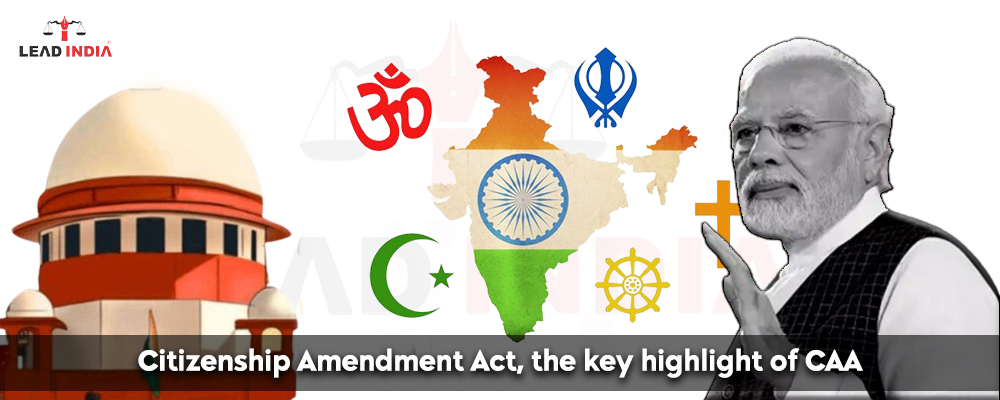The Citizenship Amendment Act (CAA) is intended to protect people who have sought asylum in India owing to religious persecution. It provides them with protection against unlawful migration proceedings. Applicants for citizenship must have entered India before December 31, 2014. Currently, Indian citizenship is conferred to people born in India or who have resided there for at least 11 years. The proposed change also provides for the cancellation of Overseas Citizen of India (OCI) registration if the OCI cardholder violates any provision of the Citizenship Act or any other applicable legislation.
Need A Legal Advice
The internet is not a lawyer and neither are you. Talk to a real lawyer about your legal issue

CAA 2019 Key Features
- Eligibility: It revised the Citizenship Act of 1955 to offer Indian citizenship to illegal migrants from Afghanistan, Bangladesh, and Pakistan who are Hindus, Sikhs, Buddhists, Jains, Parsis, or Christians.
- Who are unlawful migrants?: If an illegal immigrant enters India without appropriate travel credentials or remains longer than permitted, he or she may face prosecution, expulsion, or imprisonment.
- Those from these communities who entered India on or before December 31, 2014, will not be considered illegal immigrants, paving the way for naturalization.
- However, it makes an exception for the Muslim community.
- Relaxation:
- The amendment reduced the residency requirement for certain communities to obtain Indian citizenship by naturalization from 11 to 6 years.
- It shields members of certain groups from prosecution under the Foreigners Act of 1946 and the Passport Act of 1920.
- Applicants are not classified as “illegal immigrants.
- The modifications for illegal migrants will not affect specific tribal areas in Assam, Meghalaya, Mizoram, and Tripura, as well as states with the “Inner Line” permit under the Bengal Eastern Frontier Regulations 1873.
- The consequences of attaining citizenship are as follows: (i) such persons are assumed to be citizens of India from the date of their admission into India, and (ii) any legal procedures against them in respect of their unlawful migration or citizenship are closed.
- The 1955 Act permits the central government to cancel OCI registrations for a variety of reasons, including violating government-notified laws.
CAA Rules, 2024
Despite a more than four-year wait, the Ministry of Home Affairs has issued the Citizenship Amendment Rules, 2024, which will allow the Citizenship Amendment Act of 2019 to be implemented. Key provisions include:
- The process: According to the guidelines, eligible refugees must submit applications for citizenship with affidavits corroborating statements, character vouchers from Indian residents, and a declaration of acquaintance with a scheduled Indian language.
- E-application for the district-level committee: The guidelines require that applications be submitted electronically to a district-level committee for document verification and oath administration. Failure to present in person may result in the empowered committee rejecting the application after the district committee has reviewed it.
- Supporting documents: To support their citizenship application, applicants must provide a passport, birth certificate, identification documents, land records, or proof of lineage from Pakistan, Afghanistan, or Bangladesh.
- Verification of entry date: Applicants must submit proof of entry by December 31, 2014, using the indicated 20 documents such as FRRO registration, Census slip, government IDs (Aadhaar, ration card, license), marriage certificate issued in India, and so on.
- Digital Certificate: Approved candidates will receive a digital citizenship certificate.
Impacts of CAA, 2019
The CAA of 2019 has had a variety of effects and ramifications, prompting discussions and worries across India.
- Social polarisation: Because of its discriminatory nature, it has sparked disputes along religious lines, generating concerns about communal tensions and fissures within the country’s social fabric.
- Global censure: Major worldwide groups and democracies have criticized the law for violating international human rights and statelessness accords. It also elicited diplomatic responses from nearby countries such as Bangladesh and Pakistan.
- Violent protests: The passage of the CAA triggered significant protests across the country. Largely peaceful protests against the CAA turned violent in certain parts of Delhi, resulting in injuries.
- CAA vs. Assam Accord: The CAA’s provisions providing citizenship to persecuted minorities have raised concerns about breaking the Assam Accord 1985, which sought to locate and remove illegal immigrants in Assam after March 25, 1971.
- Disadvantage to native citizens: Native citizens are concerned that the CAA, which gives citizenship to illegal immigrants, may influence their employment and land ownership dynamics.
Lead India provides free legal advice and online information, among other legal services. We offer a platform where you can speak with a lawyer and ask legal questions. Lead India’s lawyers can help you with any legal matters. Lead India offers free online legal help in India. In addition to providing legal advice online, Lead India allows users to ask professionals questions for free.





 Talk to a Lawyer
Talk to a Lawyer